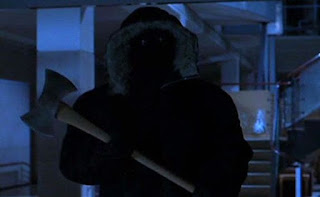Year of Release: 1993
Director: Woody Allen
Screenplay: Woody Allen and Marshall Brickman
Starring: Woody Allen, Diane Keaton, Alan Alda, Anjelica Huston, Jerry Adler
Running Time: 107 minutes
Genre: Comedy, crime
Married couple Larry (Allen) and Carole (Keaton) befriend their elderly neighbours Paul (Adler) and Lillian (Lynn Cohen). They are shocked when they learn that the seemingly perfectly healthy Lillian has suddenly died of an apparent attack, and are further disturbed by Paul's cheerful demeanour immediately afterwards. Carole becomes convinced that Paul murdered Lillian, and begins to investigate with the help of her friend, playwright Ted (Alda). Larry however is convinced that there is no mystery to solve, until it turns out that Lillian might not be dead after all.
This darkly comic mystery film was made at a very difficult time in Woody Allen's personal life as his relationship with Mia Farrow was collapsing among allegations which continue to dog Allen's reputation to this day. This was an intentionally light, playful film which Allen made to take his mind off things, and reunites him with close friend and regular co-star Diane Keaton, and other Allen regulars Alan Alda and Anjelica Huston. The film was originally conceived as a subplot in Annie Hall (1977), but was excised from the final script. The film really hearkens back to Allen's "early funny ones", lacking the introspection and philosophical themes which dominated Allen's films throughout the 1980s and early 90s. The film is overly long, and the murder plot is very convoluted, but it is funny and the chemistry between Allen and Keaton really sparkles. The mystery plot is a welcome addition to the typical wisecracks and one-liners, and the climax is really quite exciting. Alan Alda and Anjelica Huston provide reliable support. The film also marks the screen debut of Zach Braff. This is one of Allen's most purely enjoyable films, but there is an emotional core about Larry and Carole's marital difficulties. Woody Allen fans will certainly enjoy it, and it should appeal to newcomers as well.
































